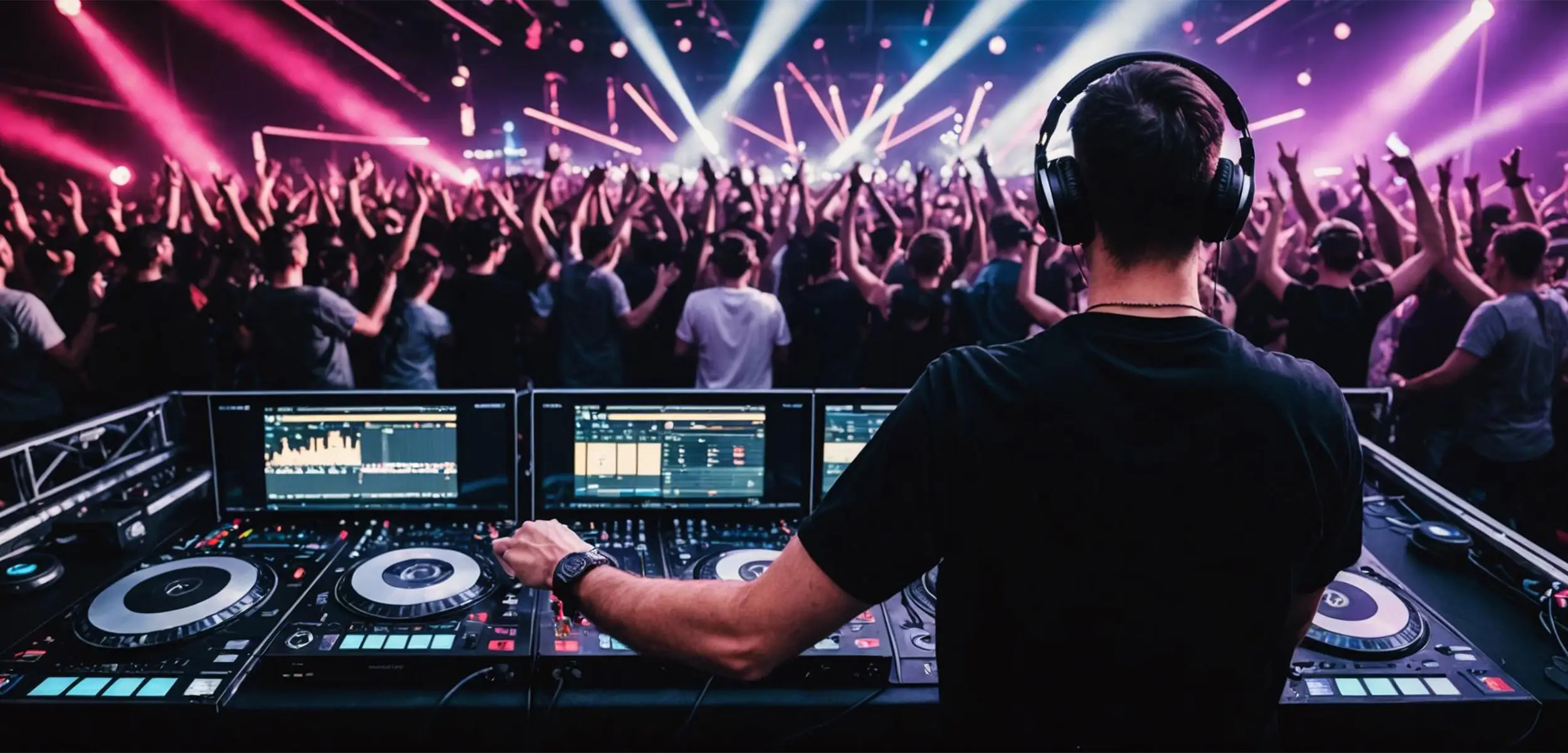In this article:
Marketing oneself as an electronic music producer demands a strategic approach to developing a brand identity. Leveraging social media, collaborating with industry professionals, and utilizing online marketing tools are essential.
By focusing on these elements, producers can effectively grow their image. This strategy allows reaching a wider audience.
Key Takeaways
- Develop a distinctive brand identity and professional image.
- Utilize social media platforms effectively to engage with your audience.
- Choose the platforms that best suit your target demographic.
- Collaborate with other artists and network at industry events.
- Leverage online marketing tools like email marketing and website optimization.
- Consistent branding and strategic partnerships can significantly expand reach.
- Effective marketing strategies are key to growing your image as an electronic music producer.
Building Your Brand Identity
Establishing a strong brand identity starts with defining their unique sound and crafting a professional image. A clear brand identity allows them to stand out in the crowded electronic music scene and attract a dedicated audience.
Define Your Unique Sound
They should invest time in experimenting with different genres and techniques to develop a signature sound that sets them apart from other producers.
Consistent production quality and a recognizable style will make listeners more likely to remember and follow their work.
This also makes it easier for fans to find and share their music.
Create a Professional Image
A polished, professional image is crucial for credibility.
This includes having high-quality photos, well-designed logos, and consistent visual themes across all platforms.
Attention to detail in album artwork, promotional materials, and social media profiles will leave a lasting impression.
Additionally, they should maintain a professional demeanor when interacting with fans and industry professionals to build a positive reputation.
Utilizing Social Media Platforms
Social media platforms are invaluable for electronic music producers. Choosing the right platforms involves understanding where their target audience spends time.
For instance, Instagram and TikTok are popular for short videos, while SoundCloud and Bandcamp cater to music enthusiasts.
They should focus on platforms that align with their music style and audience preferences to optimize engagement.
Choosing the Right Platforms
They need to identify platforms that best suit their target demographic.
- Instagram, TikTok, and Twitter are effective for visual and interactive content.
- Spotify and SoundCloud are essential for sharing tracks.
Evaluating the strengths of each platform will help them maximize reach and engagement.
Engaging with Your Audience
Consistent interaction with followers is crucial. Regularly posting updates, behind-the-scenes content, and engaging stories can keep their audience invested.
Using interactive features like polls, Q&A sessions, and live streams fosters a sense of community.
Responding to comments and messages also builds strong relationships with fans, enhancing their loyalty and support.
Collaborating and Networking
Collaborating and networking are vital for electronic music producers aiming to expand their reach. By partnering with other artists and attending industry events, they can build valuable relationships and gain exposure to new audiences.
Partner with Other Artists
Collaborating with other artists creates opportunities for cross-promotion and creative growth. They should seek out producers, vocalists, and musicians whose styles complement their own.
Joint projects can introduce their music to each other’s fan bases while fostering innovation. These partnerships often lead to mutual support and increased visibility within the industry.
Attend Industry Events
Attending industry events such as music conferences, workshops, and festivals allows producers to network with peers, influencers, and potential collaborators. They should participate in panels, showcase their music, and engage in discussions to build a professional network.
Networking at these events can lead to opportunities for collaboration, mentorship, and career advancement. Active participation in the community helps them stay informed about industry trends and best practices, further enhancing their growth as artists.
Leveraging Online Marketing Tools
Utilizing online marketing tools is crucial for enhancing visibility and engagement. Producers should employ strategies like email marketing and website optimization to create a direct connection with their audience and boost their professional image.
Use Email Marketing
Email marketing is an effective method for maintaining direct communication with fans.
Producers should build a mailing list through their website or social media channels, offering exclusive content such as early access to new tracks, event announcements, and behind-the-scenes updates.
Regular, value-driven emails can keep fans engaged, informed, and invested.
Optimize Your Website
A well-optimized website acts as a central hub for all their activities.
Key elements should include a user-friendly layout, fast load times, mobile responsiveness, and SEO techniques to improve search engine rankings.
Content should be regularly updated with new releases, tour dates, and news.
Integrating social media links and an online store for merchandise can further enhance user experience and drive conversions.
Conclusion
By developing a strong brand identity, utilizing social media, and engaging with the audience, electronic music producers can effectively enhance their image and reach a wider audience.
Collaborating with industry professionals and leveraging online marketing tools will also be beneficial. Consistency in these efforts will play a crucial role in their ongoing success and visibility in the industry.
Frequently Asked Questions
How important is a brand identity for an electronic music producer?
A strong brand identity is essential as it sets them apart from others, attracting a loyal audience and ensuring lasting recognition.
Which social media platforms should they focus on?
They should concentrate on platforms where their target audience is most active. Instagram, TikTok, SoundCloud, and Twitter are popular among music fans.
Why is collaboration with other artists beneficial?
Collaborations offer opportunities for cross-promotion, creative growth, and reaching new audiences, boosting their visibility and network in the industry.
Is email marketing effective for electronic music producers?
Yes, email marketing maintains direct communication with fans, providing exclusive content and updates that keep them engaged and loyal.
What should be prioritized on their website?
Important elements include a user-friendly design, quick load times, mobile responsiveness, and updated content like new releases and tour dates.
Read other articles
 June 23, 2025
June 23, 2025Feeling vs Technique in Music Production
Feeling vs Technique in Music Production
 June 4, 2025
June 4, 2025The Rise of the Middle Eastern Sound and its Impact on EDM
The Rise of the Middle Eastern Sound and its Impact on EDM
 April 4, 2025
April 4, 2025Stop Letting AI Master Your Tracks (Here’s What You’re Missing)
Stop Letting AI Master Your Tracks (Here’s What You’re Missing)

